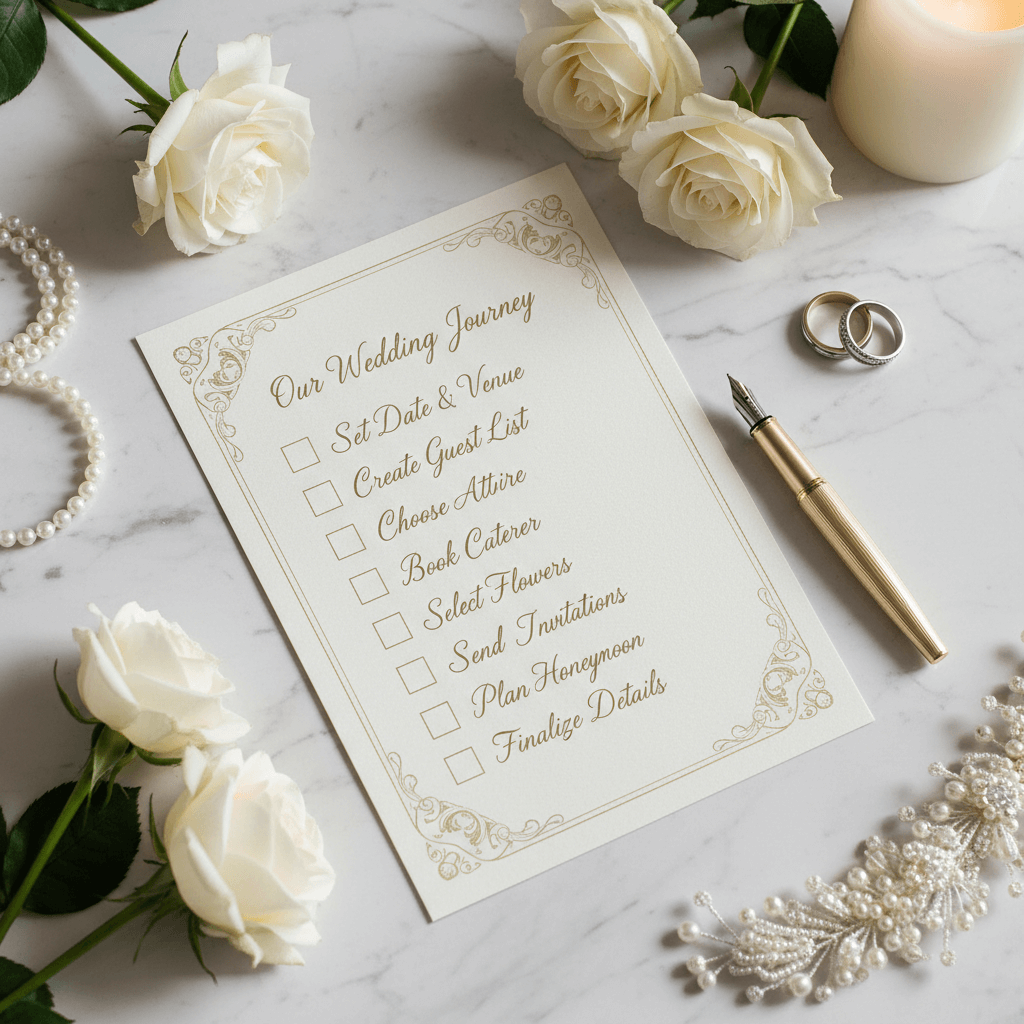Wedding Planning Checklist
Your Complete Wedding Planning Guide
A comprehensive wedding planning checklist serves as your roadmap through the complex journey of creating your perfect celebration. Without proper organization and timeline management, even the most well-intentioned couples can find themselves overwhelmed by the countless details that require attention, coordination, and decision-making. A structured checklist ensures that nothing falls through the cracks while maintaining manageable progress throughout your engagement period.
Wedding planning involves hundreds of individual tasks that must be coordinated across multiple vendors, family members, and timelines. The most successful couples approach this complexity with systematic organization that breaks down the entire process into manageable phases. Each phase builds upon the previous one, creating momentum and ensuring that early decisions support later planning requirements.
Modern wedding planning checklists go beyond simple task lists to include timeline coordination, budget tracking, vendor management, and contingency planning. They serve as both planning tools and accountability systems, helping couples maintain focus on their priorities while ensuring that practical requirements are met. The best checklists are flexible enough to accommodate different wedding styles and personal preferences while comprehensive enough to cover all essential planning elements.
12+ Months Before Your Wedding: Foundation Planning
The early planning phase focuses on establishing the fundamental framework for your entire celebration. Setting your date represents the first major decision, affecting vendor availability, seasonal pricing, and guest travel considerations. Popular wedding dates book quickly, especially at desirable venues, making early date selection crucial for accessing your preferred options.
Budget establishment during this early phase provides the financial framework for all subsequent decisions. Understanding your total available resources and allocating them across major expense categories prevents overspending in any single area while ensuring adequate funding for your highest priorities. Early budget planning also helps identify areas where additional savings might be needed.
Venue selection typically represents the largest single expense and affects numerous other planning decisions, from catering options to decor requirements. Starting venue research early provides access to the best locations while allowing time for thorough evaluation of options. Venue contracts often require significant deposits, making early financial commitment necessary for securing preferred locations.
Professional Planning Tools
Access comprehensive wedding planning checklists and timeline tools at planning.wedding/checklist – designed to keep your planning organized and on track.
Wedding Checklist Examples
Explore these professional wedding checklist designs to inspire your own planning organization. Each example demonstrates different approaches to task management, timeline coordination, and progress tracking.

Digital Checklist App

Elegant Printed Format

Minimalist Design

Vintage Classic Style

Complete Planning Binder

Visual Planning Board
9-11 Months Before: Vendor Selection and Major Decisions
The mid-range planning phase involves selecting and securing your primary vendors while making major style and theme decisions. Photographer and videographer selection requires careful consideration of style compatibility, personality fit, and package inclusions. These professionals will document your most important memories, making their selection a critical long-term decision that affects how you'll remember your celebration.
Catering decisions involve more than just menu selection – service style, dietary accommodation capabilities, and presentation standards all affect guest experience and overall celebration atmosphere. Tastings should be scheduled well in advance to allow time for menu modifications and to ensure satisfaction with food quality and presentation standards.
Music and entertainment planning encompasses ceremony musicians, cocktail hour entertainment, and reception DJs or bands. Each musical element contributes to your celebration's atmosphere and pacing, requiring coordination to ensure smooth transitions and appropriate energy levels throughout your event timeline.
6-8 Months Before: Detail Development and Guest Communications
Mid-term planning focuses on developing detailed elements while beginning guest communication processes. Save-the-date design and mailing ensures that important guests reserve your wedding date, especially crucial for destination weddings or holiday weekend celebrations. Save-the-dates should include essential travel information and accommodation details for out-of-town guests.
Attire selection requires significant lead time for ordering, alterations, and accessory coordination. Bridal gown selection often requires 4-6 months for ordering and alterations, while groomsmen's attire coordination ensures consistent appearance and proper fitting for all participants. Early attire decisions also support other style elements like flower selection and color coordination.
Floral design planning involves more than just bridal bouquet selection – ceremony decorations, centerpieces, boutonnières, and venue enhancement all require coordination with your florist. Seasonal flower availability affects both options and pricing, making early planning beneficial for both budget management and design consistency.
3-5 Months Before: Invitation and Final Vendor Coordination
The pre-final planning phase involves invitation production and final vendor detail coordination. Invitation design should reflect your overall wedding style while including all necessary information for guest planning. Wording selection affects guest expectations, while design elements support your celebration's visual theme and formality level.
Final vendor meetings ensure that all professionals understand their roles, timeline requirements, and coordination needs. These meetings should confirm delivery schedules, setup requirements, and emergency contact information. Vendor coordination meetings also provide opportunities to address any concerns or modifications that have developed during the planning process.
Transportation and accommodation arrangements for out-of-town guests require advance coordination to secure group rates and ensure adequate availability. Hotel room blocks should be established 3-4 months in advance, while transportation arrangements need confirmation of pickup times, locations, and special requirements.
1-2 Months Before: Final Preparations and Confirmations
The final planning phase involves confirming details, finalizing counts, and preparing for day-of coordination. RSVP deadline management ensures accurate headcounts for catering and seating arrangements while providing time for vendor coordination and final adjustments. Non-respondent follow-up should begin immediately after the RSVP deadline to ensure complete response collection.
Seating chart creation requires careful consideration of guest relationships, accessibility needs, and social dynamics. Final seating arrangements should balance family obligations with guest comfort while supporting natural conversation and celebration participation. Seating charts should be finalized and communicated to venue coordinators at least one week before the wedding.
Final vendor confirmations should include timeline verification, delivery schedules, and emergency contact information. Each vendor should receive detailed timeline information and contact details for day-of coordination. Final payments and gratuity preparation should be organized in advance to avoid day-of financial management stress.
Complete Planning Resources
Discover comprehensive wedding planning tools and expert guidance at planning.wedding – your complete resource for organized, stress-free wedding planning.
Final Week: Day-of Preparation and Coordination
The final week requires careful attention to last-minute details while maintaining calm focus on the celebration itself. Weather contingency plans should be finalized for outdoor elements, with backup options confirmed and communicated to all relevant vendors. Guest communication systems should be prepared for any last-minute updates or changes.
Emergency kit preparation ensures that minor issues don't become major problems during your celebration. Essential items include stain removal supplies, basic sewing materials, pain relievers, and backup makeup for touch-ups. Designated helpers should be briefed on emergency kit contents and basic problem-solving protocols.
Final beauty appointments should be scheduled strategically to ensure optimal appearance without last-minute stress. Hair and makeup trials should be completed well in advance, with final appointments scheduled to allow adequate preparation time without rushing. Manicure timing should account for potential last-minute tasks that might affect nail appearance.
Wedding Day: Execution and Celebration
Wedding day success depends on thorough preparation and trusted coordination support. Timeline adherence ensures that all vendors can complete their services effectively while maintaining guest comfort and celebration flow. Designated coordinators should handle vendor questions and minor issues, allowing the couple to focus on enjoying their celebration.
Communication protocols should be established for handling any unexpected situations that arise during the celebration. Key family members and wedding party participants should understand their roles in timeline management and guest coordination. Emergency contact information should be readily available to all coordination personnel.
The most important wedding day advice is to remain flexible and focus on the celebration's purpose – celebrating your commitment surrounded by loved ones. Minor imperfections are rarely noticed by guests and never diminish the significance of your marriage celebration. Trust your preparation, rely on your support team, and embrace the joy of your special day.